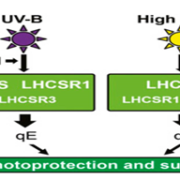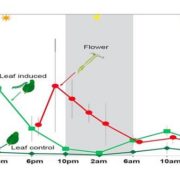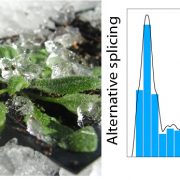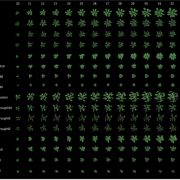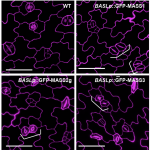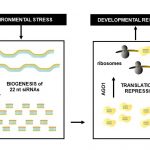An RNA thermoswitch regulates daytime growth in Arabidopsis (Nature Plants)
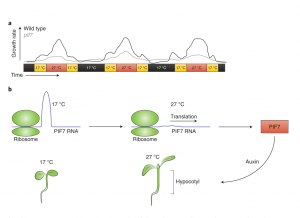 Plants are sessile organisms and as such they must be highly responsive to environmental cues including temperature, and adjust their growth and development accordingly. Considering that mean global surface temperatures are expected to continue to rise dramatically in the 21st century, it is crucial to understand how plants respond to elevated temperatures. Here, Chung et al. reveal that the mRNA of the transcription factor PHYTOCHROME INTERACTING FACTOR7 (PIF7) behaves like an “RNA thermometer” to regulate daytime growth in Arabidopsis (check out this twitter thread). Using ribosome profiling and RNA-Seq, the authors found that PIF7 was preferentially translated in response to warmer daytime temperatures. A vast array of techniques were employed to uncover the underlying mechanism behind this phenomenon. It was revealed that an RNA hairpin exists within the 5′-untranslated region of PIF7 which at lower temperatures (17°C) prevents translation. However, warmer temperatures (27°C) lead to a partial unfolding of the hairpin, triggering a more relaxed conformation, facilitating translation. Elevated PIF7 translation induces the transcription of genes required for growth and auxin biosynthesis and mutagenesis experiments demonstrated the pronounced role of PIF7 in thermomorphogenesis, namely regarding hypocotyl elongation and stomata formation. Furthermore, similar RNA thermoswitch mechanisms were revealed for the transcription factors WRKY22 and HSFA2. Thus, RNA thermoswitches may represent a conserved mechanism for adaptive responses to high temperatures in plants, symbolizing an exciting prospect for the plant thermomorphogenesis research field. (Summary by Caroline Dowling @CarolineD0wling ) Nature Plants 10.1038/s41477-020-0633-3 (Image credit: Kasper van Gelderen and Ronald Pierik 10.1038/s41477-020-0643-1)
Plants are sessile organisms and as such they must be highly responsive to environmental cues including temperature, and adjust their growth and development accordingly. Considering that mean global surface temperatures are expected to continue to rise dramatically in the 21st century, it is crucial to understand how plants respond to elevated temperatures. Here, Chung et al. reveal that the mRNA of the transcription factor PHYTOCHROME INTERACTING FACTOR7 (PIF7) behaves like an “RNA thermometer” to regulate daytime growth in Arabidopsis (check out this twitter thread). Using ribosome profiling and RNA-Seq, the authors found that PIF7 was preferentially translated in response to warmer daytime temperatures. A vast array of techniques were employed to uncover the underlying mechanism behind this phenomenon. It was revealed that an RNA hairpin exists within the 5′-untranslated region of PIF7 which at lower temperatures (17°C) prevents translation. However, warmer temperatures (27°C) lead to a partial unfolding of the hairpin, triggering a more relaxed conformation, facilitating translation. Elevated PIF7 translation induces the transcription of genes required for growth and auxin biosynthesis and mutagenesis experiments demonstrated the pronounced role of PIF7 in thermomorphogenesis, namely regarding hypocotyl elongation and stomata formation. Furthermore, similar RNA thermoswitch mechanisms were revealed for the transcription factors WRKY22 and HSFA2. Thus, RNA thermoswitches may represent a conserved mechanism for adaptive responses to high temperatures in plants, symbolizing an exciting prospect for the plant thermomorphogenesis research field. (Summary by Caroline Dowling @CarolineD0wling ) Nature Plants 10.1038/s41477-020-0633-3 (Image credit: Kasper van Gelderen and Ronald Pierik 10.1038/s41477-020-0643-1)
[altmetric doi=”10.1038/s41477-020-0643-1″ details=”right” float=”right”]



